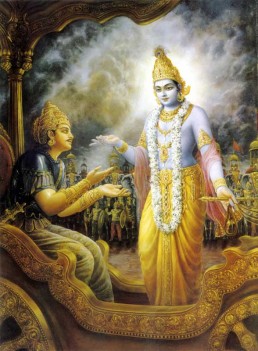Swami Chinmayananda
Swami Chinmayananda Commentary
The Wheel-of-Action explained above is generally applicable to the majority of seekers, and actions in the world undertaken in a spirit of Yajna integrate their personality and make them more and more prepared for the highest vocation in life, meditation. Through selfless work, an individual gains an increasing amount of inner poise and when such a single-pointed mind is brought to function at the meditation seat, the meditator gains the experience of transcending his limited ego. To such a perfected one, work is not a training to purify himself but it is a fulfilment of his own God-realisation.
It is a fact that we are egged on to activity seeking and demanding a better SATISFACTION and a complete CONTENTMENT. Satisfaction and contentment are the two wheels of the life-chariot. In order to gain a better satisfaction and to reach nearer the point of contentment we are goaded to act in the outer world, to earn and to save, to hoard and to spend. But the man of perfection, who on transcending his limited identification with his matter-envelopments, when he gets himself ushered into the All-perfect Realm of the Spirit, he comes to feel so satisfied with the State of Self-hood which he thereby attains, that he experiences a complete sense of contentment in the very Divine Nature, and that provides eternal satisfaction for him.
Where satisfaction and contentment have arrived, there, in that bosom, desires cannot arise at all; and where the desires are not, there cannot be any action. Thus, the effects (Karya) are not possible in him; the effects of the spiritual ‘ignorance’and ‘desires,’ ‘thoughts’ and ‘actions.’ Naturally, in such an individual there cannot be any “obligatory duty”; all work has been at once fulfilled in him. Thereafter, he is free to act, or not to act, to serve, or not to serve, and lives as a God-man upon the earth.
MOREOVER:
Adi Sankara Commentary
Tu, but; that manavah, man, the sannyasin, the man of Knowledge, steadfast in the knowledge of the Self; yah, who; atmaratih eva syat, rejoices only in the Self-not in the sense objects; and atma-trptah, who is satisfied only with the Self-not with food and drink; and is santustah, contented; eva, only; atmani, in the Self; tasya, for him; na vidyate, there is no; karyam, duty [Duty with a view to securing Liberation.] to perform. [Rati, trpti and santosa, though synonymous, are used to indicate various types of pleasures. Or, rati means attachment to objects; trpti means happiness arising from contact with some particular object; and santosa means happiness in general, arising from the acquisition of some coveted object only.] All people surely feel contened by acquiring an external thing. But this one, without depending on it, remains contented only with the Self; thta is to say, he remains detached from everything. The idea it that, for a man who is such a knower of the Self, there is no duty to undertake.
The Bhagavad Gita with the commentary of Sri Sankaracharya – Translated by Alladi Mahadeva Sastry
Holy Geeta – Commentary by Swami Chinmayananda
The Bhagavad Gita by Eknath Easwaran – Best selling translation of the Bhagavad Gita
The Bhagavad Gita – Translation and Commentary by Swami Sivananda
Bhagavad Gita – Translation and Commentary by Bhaktivedanta Swami Prabupadha
Srimad Bhagavad Gita Chapter 3 – Verse 17 – 3.17 yas tvatma-ratir – All Bhagavad Gita (Geeta) Verses in Sanskrit, English, Transliteration, Word Meaning, Translation, Audio, Shankara Bhashya, Adi Sankaracharya Commentary and Links to Videos by Swami Chinmayananda and others – 3-17

